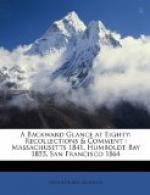My father was an inveterate trader, and the year after our coming he joined with another venturer in buying the standing crop of wheat in Hoopa Valley, on the Trinity River. I went up to help in the harvesting, being charged with the weighing of the sacked grain. It was a fine experience for an innocent Yankee boy. We lived out of doors, following the threshers from farm to farm, eating under an oak tree and sleeping on the fragrant straw-piles. I was also the butt of about the wildest lot of jokers ever assembled. They were good-natured, but it was their concerted effort to see how much I could stand in the way of highly flavored stories at mealtime. It was fun for them, besides they felt it would be a service to knock out some of the Boston “sissiness.” I do not doubt it was. They never quite drove me away from the table.
In the meantime I had a great good time. It was a very beautiful spot and all was new and strange. There were many Indians, and they were interesting. They lived in rancherias of puncheons along the river. Each group of dwellings had a musical name. One village was called Matiltin, another Savanalta. The children swam like so many ducks, and each village had its sweathouse from which every adult, to keep in health and condition, would plunge into the swiftly flowing river. They lived on salmon, fresh or dried, and on grass-seed cakes cooked on heated stones. They were handsome specimens physically and were good workers. The river was not bridged, but it was not deep and canoes were plenty. If none were seen on the side which you chanced to find yourself, you had only to call, “Wanus, matil!” (Come, boat!) and one would come. If in a hurry, “Holish!” would expedite the service.
The Indian language was fascinating and musical. “Iaquay” was the word of friendly greeting. “Aliquor” was Indian, “Waugee” was white man, “Chick” was the general word for money. When “Waugee-chick” was mentioned, it meant gold or silver; if “Aliquor-chick,” reference was made to the spiral quill-like shells which served as their currency, their value increasing rapidly by the length. [Footnote: In the Hawaiian Islands short shells of this variety are strung for beads, but have little value.] There are frequent combined words. “Hutla” is night, “Wha” is the sun; “Hutla-wha” is the moon—the night-sun. If an Indian wishes to ask where you are going, he will say, “Ta hunt tow ingya?” “Teena scoia” is very good. “Skeena” is too small. “Semastolon” is a young woman; if she is considered beautiful, “Clane nuquum” describes her.
The Indians were very friendly and hospitable. If I wanted an account-book that was on the other side of the river, they would not bother for a canoe, but swim over with it, using-one hand and holding the book high in the air. I found they had settled habits and usages that seemed peculiar to them. If one of their number died, they did not like it referred to; they wished for no condolence. “Indian die, Indian no talk,” was their expression.




